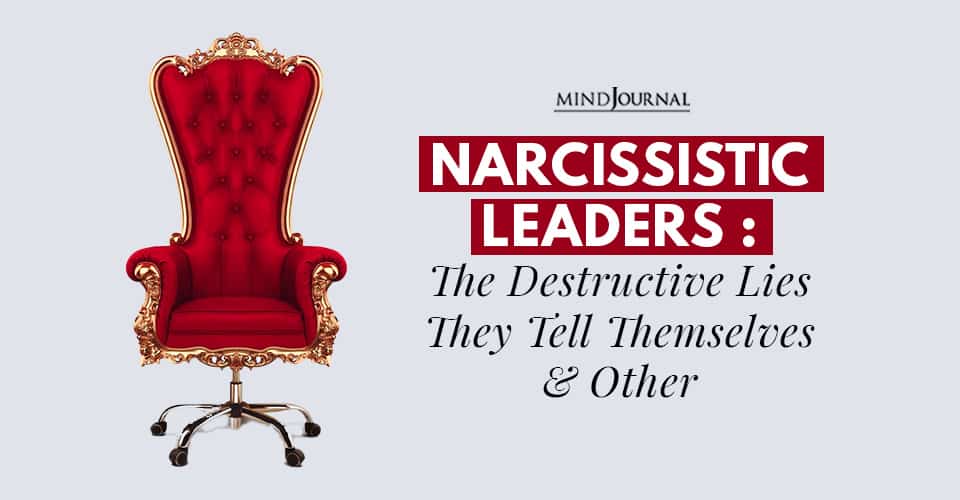When I was working in the corporate arena years ago, I had the great misfortune of reporting to and working with a number of extremely toxic colleagues, managers and narcissistic leaders whose behaviour hurt me and was also a complete mystery to me.
I couldn’t understand their raging, their defensiveness, they inability to be challenged or questioned, or their penchant for drumming people out who were not obsequious and total “yes” people to them. And it was astounding to me that leadership and management allowed these individuals to remain in their posts, doing all this damage.
After I became a marriage and family therapist and career coach, I learned a great deal about narcissistic personality disorder, and how it can wreak havoc on those who are in relationships with the narcissist. (Here’s more on how to recognize NPD in your boss and what to do about it.) Several years ago, I wished to help adult children of narcissists in a more direct way and built a Facebook group of over 2,000 adults who’d been dramatically and negatively affected by the narcissists in their lives. From their sharing, it was even more evident how destructive narcissism is in our lives and work.
From my view, we all need to understand narcissistic personality disorder more deeply, not to attack or demean narcissistic leaders, but to protect ourselves from harm, build stronger boundaries, and learn more about how to navigate effectively through the challenges of working with individuals who demonstrate these traits.
Towards that end, I was excited to catch up this month with Dov Baron. Baron has been twice cited as one of Inc. Magazine’s Top 100 Leadership Speakers and named as one of the Top 30 Global Leadership Gurus. He works with international leaders and organizations who are committed to finding the “Why beneath their Why” to create a positive legacy that lifts humanity.
Baron has deep experience with narcissistic leaders and has important information to share on the issue. Here’s his take:
Kathy Caprino: One thing you stress in your work is the need for leaders to have a strong relationship with self. What does that mean?
Dov Baron: Great leaders understand that all leadership is relationship-based. Furthermore, for relationships to be productive, they must have a degree of closeness and understanding—intimacy, if you will. Intimacy with another cannot take place until we have a strong self-relationship—intimacy with ourselves. That kind of intimacy comes only from sustained self-growth.
Related: Why Narcissists Twist The Truth: Logical Explanation
Caprino: What types of leaders and influencers struggle the most with forging a strong relationship with self?
Baron: If, at some level, we have been indoctrinated with the idea we are “not enough,” we either go on a rampage to prove that we are enough (which, while it can result in massive success, often leaves an emotional mess in its wake) or we quit on ourselves. In either case, it becomes difficult to forge a strong, intimate relationship with ourselves or with others because we are so externally driven. In these cases, self-inquiry is seen as an admission of weakness or fault.
Caprino: In your work with top influencers and leaders, you’ve said you’ve seen a good deal of narcissism. What do narcissistic leaders tell themselves and others?
Baron: The narcissistic leaders will always argue that their results justify their means. They will often use grandiose language about a greater good, which is how they con others into following them, but the truth is that everyone is merely a pawn in the narcissist’s game. They see others as less—less intelligent, less worthy, less capable, less deserving—and that’s how they justify their lies and manipulations.
Caprino: Why are narcissistic lies so damaging?
Baron: It starts with a need of the narcissistic leaders to always to be right, the inability to apologize, and a pervasive air of entitlement. The result is that such a leader does not get to grow and will invariably end up surrounded by sycophants. Such a leader not only damages the culture and morals, they will invariably suffocate innovation. We know and the research is clear—people who do not feel emotionally safe stop innovating.

Related: Difference Between Borderline Personality Disorder and Narcissistic Personality Disorder
Caprino: You shared that when you were younger, you would “steal the light” from others. Could you talk about this a bit?
Baron: Yes, I shamefully admit that I “stole the light” many times, until I realized what I was doing and stopped.
What I mean by “stealing the light” is taking credit that is not entirely yours. Let me give you an example. We were brought in to work with an executive team in helping them find their purpose. We did a couple of sessions and made great progress. However, when we went back after each session there had been a clear drop in morale.
The first time we wrote it off; the second time I directly addressed it. I heard the same message from three separate members of the team. After we would leave, the founder of the company would not only downplay the work my team had done but he would claim that all the great input came from him. As you can imagine this was having a devastating impact on the engagement of the process and of working there.
I set up a separate time to go for a walk with the founder (who in many ways is a great guy). I shared with him what was happening, even though he was initially very defensive. We continued walking in silence for a little while.
Related: Treating Narcissistic Personality Disorder: 10 Stages You Must Know About
I could see he was thinking about what I’d shared and that no one dared tell him this truth. Suddenly stopped in his tracks and turned to me and asked, “How could I be doing that and not even know?” His concern was genuine. He was behaving like a narcissistic leader and he had no idea. “Why would I even want to do this?”
I asked, “When you were a child how did you get attention?” He responded, “Being the middle child of five, I never could.”
Even as he answered it was obvious that the realization was hitting him like a truck. As an adult, he was still trying to get attention. This is why leaders must be fully committed to their self-inquiry. Without self-knowledge we are all fumbling in the dark and unable to see or deal with our “blind spots.”
Caprino: You’ve also written about leaders needing to find their “why beneath the why.” What does that mean?
Baron: For most people, finding their why is barely different than creating a mission statement or even setting a vision. However, when we help leaders find the “Why Beneath the Why,” we are tapping into the primary drivers of a leader and an organization. Take the example of the founder who was stealing the light from his team. Until we could elicit the why of his why (the unconscious drivers determining his behavior), he was going to keep doing what didn’t work.
By the way, Simon Sinek wrote a great book Start with Why that has helped many leaders understand the value of finding their why.
Related: Dehumanization: A Narcissist’s Ultimate Manipulation Tool
Caprino: Finally, what is the one thing a leader should do to build a connection with themselves and a connected culture in their organization?
Baron: Great question! First and foremost, the leaders of the future must be deeply and sincerely emotionally intelligent. Therefore the place to start is with an ongoing commitment to developing self-knowledge.
To be clear, this is not possible on our own. No matter how smart we think we are, no one is objective in their subjective reality. Find a guide who will not let you skate on your past merits. I often hear from the clients who qualify to work with me that no one has been as fierce with them or has held them fully accountable. Without someone helping a leader with fierce accountability, they will continue to do the same old things.
Written by: Kathy Caprino
Originally appeared on: Kathycaprino.com
Want to dramatically boost your power, confidence and impact in your career? Check out my new book - The Most Powerful You: 7 Bravery-Boosting Paths to Career Bliss - today! To order in Australia and New Zealand, click here, in the UK, click here, and elsewhere outside North America, click here. Thank you!











Leave a Reply